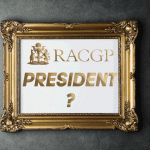The RACGP presidential candidates all want to increase GPs' lobbying power in Canberra, but are there tradeoffs?
The six candidates running for RACGP president say they want stronger GP lobbying in Canberra.
But how do they plan to compete with the Pharmacy Guild of Australia, without looking like they are only there to line GP pockets?
This was one question asked of the 2020 presidential candidates in an online Q&A session hosted on Tuesday evening by the ABC Walkley award-winning journalist, Virginia Trioli.
Dr John Buckley, Associate Professor Charlotte Hespe, Dr Chris Irwin, Dr Karen Price, Associate Professor Ayman Shenouda and Dr Magdalena Simonis all spoke about the need to be heard as loudly as the Guild and the Royal College of Pathologists of Australasia (RCPA) by Health Minister Greg Hunt.
But all candidates had various ideas about the moral cloudiness of becoming a fierce and active lobby, while maintaining the public perception of the RACGP as putting patient care first.
Dr John Buckley, a Queensland GP working in GP training and clinical practice, said pharmacy owners’ influence in Canberra came both from great lobbying and political donations.
The Guild donated $774,000 to the major parties in 2019, according to the Australian Electoral Commission.
“I don’t believe our members would want us to spend large amounts of money on political donations,” he said.
“I do believe our members would like us to spend money on really effective lobbyists and I’m happy to hear the view of members over time.”
Dr Karen Price, a Melbourne GP and co-founder of GPs Down Under, said she felt uncomfortable at the idea of the RACGP making donations to all the political parties.
“It’s not about paying government, it’s about engaging patients about their healthcare dollar and then arguing for primary care and their access to it,” she said.
Professor Charlotte Hespe, Sydney GP and practice owner, said that getting results while maintaining public trust would be about selling a positive story.
“I’m not there just to increase the income into the GP’s pocket; I’m there selling the story about what we as GPs offer the Australian population,” she said.
Professor Hespe said that GPs had been “sitting on the sidelines” allowing hospitals to suck up taxpayer dollars and that it was time to “stand up proud” and tell the valuable GP story in Canberra.
But Dr Chris Irwin, a Victorian GP and practice owner, said that by not engaging in the same legal political systems that other lobby groups do, the RACGP was missing out on being able to effectively advocate for patient health.
“The pathologists and the pharmacists are using very legal means, that in my opinion, are increasing patient costs, fragmenting patient care, and producing poorer health outcomes,” he said.
“At some point, we have to ask what harm we are doing our patients by failing to act in a legal and responsible manner to advocate effectively for them.”
Professor Ayman Shenouda, a GP from Wagga Wagga NSW, said it was also important to keep in mind that lobbying is a long-term commitment.
Professor Shenouda said that the RACGP’s access to politicians had already improved dramatically over the past few years.
Dr Magdalena Simonis, a Melbourne GP, said that amid the discussion of how to become a powerful GP voice in Canberra, everyone was forgetting how fragmented the profession had become.
“We talk about RACGP lobbying but we haven’t brought into the discussion the AMA, ACRRM and the other peak GP bodies,” she said.
This not only weakened the presence of GPs in Canberra, but also weakened the GP position on big issues such as renumeration and funding to primary care, Dr Simonis said.
Regardless of how the RACGP will navigate the public perception of lobbying, the candidates agree that government is a long way from seeing the value of GPs in the health system.
But it remains unclear whether the next college president will stick to the status quo or employ a lobbying strategy similar to the one that has brought – and bought – the pharmacists so much success, regardless of reputation.




